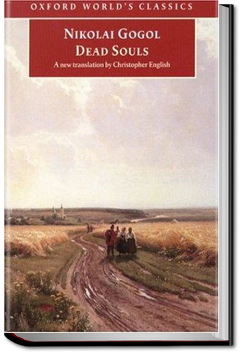

Ascending the narrow wooden staircase to the upper floor, and arriving upon a broad landing, Chichikov found himself confronted with a creaking door and a stout old woman in a striped print gown. "This way, if you please," she said. Within the apartment designated Chichikov encountered the old friends which one invariably finds in such roadside hostelries—to wit, a heavy samovar, four smooth, bescratched walls of white pine, a three-cornered press with cups and teapots, egg-cups of gilded china standing in front of ikons suspended by blue and red ribands, a cat lately delivered of a family, a mirror which gives one four eyes instead of two and a pancake for a face, and, beside the ikons, some bunches of herbs and carnations of such faded dustiness that, should one attempt to smell them, one is bound to burst out sneezing.
"Have you a sucking-pig?" Chichikov inquired of the landlady as she stood expectantly before him.
"Yes."
"And some horse-radish and sour cream?"
"Yes."
"Then serve them."
The landlady departed for the purpose, and returned with a plate, a napkin (the latter starched to the consistency of dried bark), a knife with a bone handle beginning to turn yellow, a two-pronged fork as thin as a wafer, and a salt-cellar incapable of being made to stand upright.
Following the accepted custom, our hero entered into conversation with the woman, and inquired whether she herself or a landlord kept the tavern; how much income the tavern brought in; whether her sons lived with her; whether the oldest was a bachelor or married; whom the eldest had taken to wife; whether the dowry had been large; whether the father-in-law had been satisfied, and whether the said father-in-law had not complained of receiving too small a present at the wedding. In short, Chic
Get ALL YOU CAN BOOKS absolutely FREE for 30 days. Download our FREE app and enjoy unlimited downloads of our entire library with no restrictions.
Have immediate access and unlimited downloads to over 200,000 books, courses, podcasts, and more with no restrictions.
Everything you download during your trial is yours to keep and enjoy for free, even if you cancel during the trial. Cancel Anytime. No risk. No obligations.
For just $24.99 per month, you can continue to have unlimited access to our entire library. To put that into perspective, most other services charge the same amount for just one book!

As avid readers, we understand the joy of immersing ourselves in a captivating story or getting lost in the pages of a good book. That's why we founded All You Can Books back in 2010, to create a platform where people can access an extensive library of quality content and discover new favorites.
Since our founding days, we’ve continuously added to our vast library and currently have over 200,000 titles, including ebooks, audiobooks, language learning courses, podcasts, bestseller summaries, travel books, and more! Our goal at All You Can Books is to ensure we have something for everyone.
Join our community of book lovers and explore the world of literature and beyond!